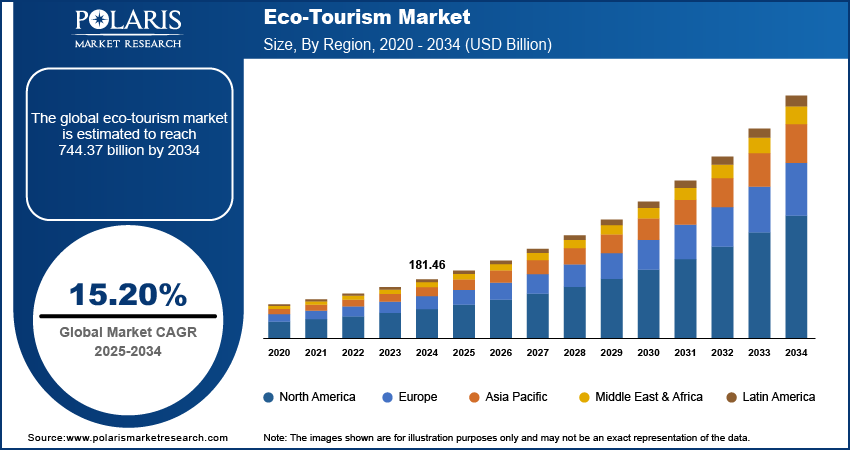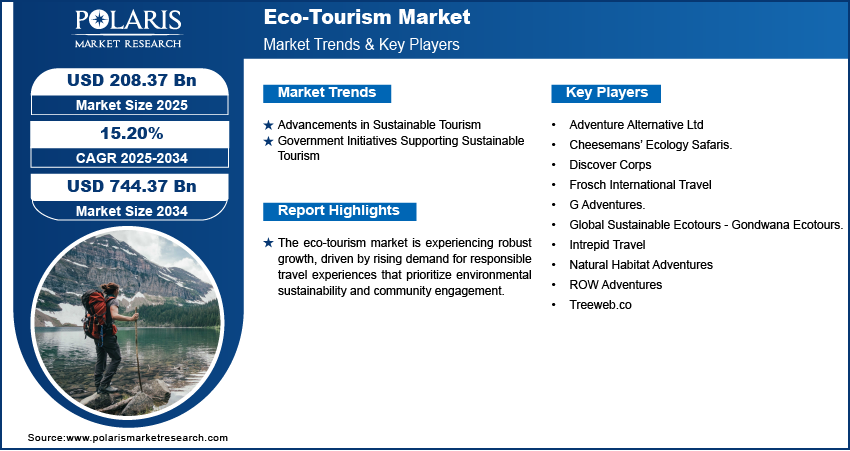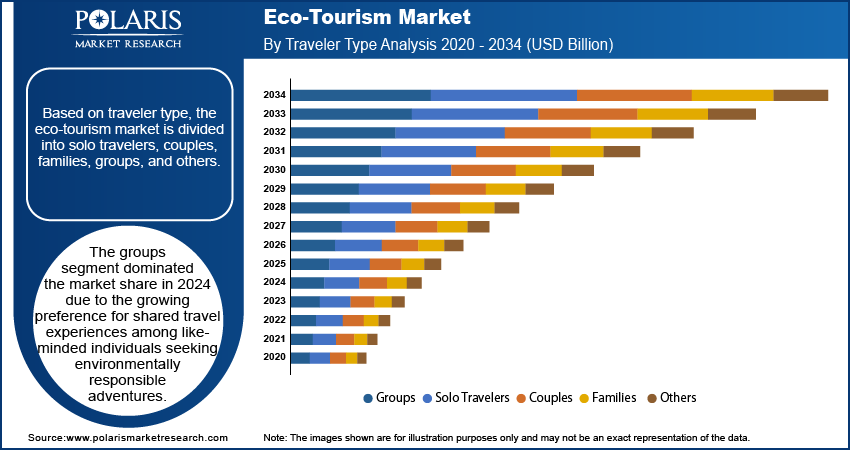
Ecotourism Market Size, Share, Trends, Industry Analysis Report
: By Activity Type, By Traveler Type, By Accommodation Type (Eco-Lodges, Sustainable Hotels, Homestays, Glamping, and Others), and By Region– Market Forecast, 2025–2034
- Published Date:May-2025
- Pages: 129
- Format: PDF
- Report ID: PM5626
- Base Year: 2024
- Historical Data: 2020-2023
Ecotourism Market Overview
The global ecotourism market size was valued at USD 181.46 billion in 2024. It is expected to grow from USD 208.37 billion in 2025 to USD 744.37 billion by 2034, at a CAGR of 15.20% during 2025–2034.
Ecotourism, a form of responsible travel to natural areas that conserves the environment and improves the well-being of local communities, has emerged as a pivotal trend within the global tourism industry. The market is witnessing substantial interest driven by a shift in consumer values as travelers become increasingly conscious of their ecological footprint. The rising environmental awareness among individuals, especially millennials and Gen Z consumers, has boosted the development. These environmentally conscious travelers actively seek experiences that don’t harm ecosystems and support biodiversity. A January 2025 Earth.org report highlighted that the sixth mass extinction is accelerating, with over 500 land animal species nearing extinction, projected to be lost within 20 years, matching the total lost in the entire 20th century, based on 2021 analysis. As a result, tour operators and destinations are prioritizing sustainable practices, such as eco-friendly accommodations and low-impact activities, to meet evolving expectations and align with global sustainability goals.

To Understand More About this Research: Request a Free Sample Report
The emergence of regenerative travel is elevating ecotourism to a new paradigm. Unlike traditional sustainable travel, which focuses on minimizing negative impacts, regenerative travel emphasizes leaving a place better than it was found. In the Sustainable Travel Report 2023, which collected insights from over 33,000 travelers across 35 countries and territories, 76% of global travelers and 56% of Japanese travelers expressed a desire to adopt more sustainable travel practices. This approach seeks to actively restore natural habitats, empower local cultures, and promote long-term ecological balance. Destinations are reimagining their tourism models to foster deep, as this mindset gains traction, reciprocal relationships between travelers and the environments they visit. The ecotourism sector is positioned to play a transformative role in shaping the future of responsible global travel by going beyond sustainability to embrace regeneration.
Market Dynamics
Advancements in Sustainable Tourism
Advancements in sustainable tourism enable the integration of innovative practices that reduce the environmental impact of travel while enhancing visitor experiences. These advancements include the adoption of green technologies, responsible infrastructure development, and the implementation of eco-certifications and standards across the tourism value chain. Ecotourism offerings are becoming more accessible, efficient, and appealing to environmentally conscious travelers as stakeholders prioritize sustainability in tour operations, hospitality services, and transportation. For instance, in January 2024, IHCL completed nine pilot projects with IFC’s TechEmerge program, implementing sustainable cooling solutions in India’s hospitality sector within 18 months. The initiative highlights IHCL’s focus on eco-friendly, cost-effective climate technologies. This evolution supports a structured transition from conventional tourism toward a model that balances ecological integrity with economic and cultural enrichment. Hence, advancements in sustainable tourism are driving the market growth.
Government Initiatives Supporting Sustainable Tourism
Government initiatives supporting sustainable tourism reinforce the ecotourism market expansion by creating policy frameworks and incentives that encourage responsible travel behavior and investments. Through regulations, funding programs, and strategic partnerships, governments are fostering the growth of ecotourism infrastructure and promoting conservation-based tourism models. For instance, an August 2024 Ministry of Tourism report outlined India’s National Strategy for sustainable tourism, focusing on environmental, economic, and socio-cultural sustainability. Initiatives include the Travel for Life program and Swadesh Darshan 2.0 to promote responsible tourism practices and destination development. These initiatives guide industry players toward sustainable practices and also raise public awareness, ensuring that both supply and demand align with long-term environmental goals. As a result, such institutional support plays a critical role in legitimizing and scaling ecotourism as a mainstream and viable segment within the broader tourism landscape.

Segment Insights
Market Assessment by Traveler Type
The segmentation based on traveler type, includes solo travelers, couples, families, groups, and others. The groups segment dominated the ecotourism market share in 2024 due to the growing preference for shared travel experiences among like-minded individuals seeking environmentally responsible adventures. Group travel often provides cost efficiencies, logistical convenience, and a sense of community, which aligns well with the collective ethos of ecotourism. Tour operators have increasingly tailored packages for educational institutions, corporate teams, and eco-conscious travel clubs, making group-based ecotourism more structured and attractive. Additionally, group dynamics often foster deeper engagement with local cultures and environmental conservation activities, further reinforcing the segment’s strong market presence.
Market Evaluation by Accommodation Type
The segmentation based on accommodation type, includes eco-lodges, sustainable hotels, homestays, glamping, and others. The glamping segment is expected to witness the fastest growth during the forecast period due to a unique blend of outdoor immersion and upscale comfort, catering to travelers seeking eco-conscious experiences without compromising on luxury travel. Glamping accommodations, such as treehouse glamping, are often situated in pristine natural settings and designed with sustainable materials, renewable energy sources, and minimal environmental impact. This model appeals to a broad demographic, from adventure seekers to wellness travelers who desire an authentic connection with nature alongside modern amenities. Thus, as awareness of low-impact tourism rises, glamping’s ability to merge ecological responsibility with experiential travel makes it a compelling and rapidly growing alternative accommodation choice.

Regional Analysis
By region, the report provides insights into North America, Europe, Asia Pacific, Latin America, and the Middle East & Africa. Europe dominated the revenue share in 2024 owing to its well-established infrastructure, strong environmental regulations, and mature travel market characterized by high sustainability awareness. The region’s longstanding commitment to conservation, coupled with widespread consumer demand for ethical and responsible tourism, has positioned Europe as a leader in ecotourism. According to the European Travel Commission's February 2025 findings, tourism activity in Europe grew by 6.7% over 2023 levels, accompanied by a 4.8% increase in overnight stays. Furthermore, many European destinations offer a diverse array of protected natural sites, cultural heritage experiences, and eco-certified accommodations that align with the core values of ecotourism. This alignment between policy, demand, and infrastructure has contributed to the region’s dominant market performance.
The Asia Pacific is projected to witness the fastest growth during the forecast period due to its rich biodiversity, expanding middle-class population, and rising interest in sustainable travel practices. Countries in the region are increasingly promoting their ecological assets and cultural heritage through responsible tourism initiatives, attracting both domestic and international eco-conscious travelers. In addition, growing investments in ecotourism infrastructure and community-based tourism projects are enabling the region to tap into unmet demand for nature-based and regenerative travel experiences. A December 2024 Ministry of Tourism report approved 40 projects worth USD 397 million to develop lesser-known tourism sites across 23 Indian states, aiming to redistribute tourist traffic, boost local economies, and ensure sustainable sector growth. Thus, as awareness and accessibility improve, Asia Pacific is emerging as a growth hub for the global ecotourism industry.

Ecotourism Market – Key Players & Competitive Analysis Report
The ecotourism industry exhibits dynamic competitive positioning with established operators and emerging regional specialists adopting sustainability strategy and transformation as core differentiators. Economic and geopolitical shifts are dramatically reshaping destination popularity, with previously untapped markets in Southeast Asia and Latin America experiencing rapid growth due to strategic investments in conservation infrastructure. Industry trends reveal consumers increasingly valuing authentic experiences over luxury amenities, creating expansion opportunities for small and medium-sized businesses with strong local connections. Supply chain disruptions from climate events necessitate adaptive business models, with successful operators developing resilient partner & customer ecosystems to weather seasonal volatility. Technological advancements in digital booking platforms and virtual reality previews have created competitive advantages for early adopters. At the same time, international collaboration between operators, conservation groups, and indigenous communities strengthens regional footprint and enhances authenticity. Revenue growth projections remain strong despite economic fluctuations, particularly in emerging markets where rising middle classes seek environmentally responsible travel experiences. The future of industry ecosystems will likely revolve around regenerative tourism models that provide measurable ecological benefits alongside unique visitor experiences, with competitive benchmarking increasingly focused on verifiable sustainability metrics rather than traditional hospitality standards. A few key major players are Adventure Alternative Ltd, Cheesemans' Ecology Safaris, Discover Corps, Frosch International Travel, G Adventures, Gondwana Ecotours, Intrepid Travel, Natural Habitat Adventures, ROW Adventures, and Treeweb.co.
Discover Corps is a Certified B Corporation that specializes in ecotourism and sustainable travel experiences designed to connect travelers with local communities, wildlife, and cultural heritage. Founded in 2011, the organization aims to foster global understanding and advocacy for environmental and cultural preservation through immersive travel. Its itineraries focus on meaningful interactions, such as participating in conservation projects, engaging with local traditions, and volunteering in community development initiatives. Discover Corps emphasizes ethical partnerships by collaborating with responsible organizations that protect wildlife, preserve ecosystems, and support local economies. The company’s approach to ecotourism incorporates environmentally friendly practices such as using sustainable accommodations and promoting low-impact activities. It also prioritizes the preservation of cultural heritage by offering unique experiences that celebrate local traditions and resist commercialized tourism. Discover Corps ensures long-term benefits for the communities it visits by working closely with local experts and organizations to address specific needs, such as building classrooms or improving water storage systems. Travelers contribute to positive change while gaining deeper cultural insights and fostering global citizenship by choosing Discover Corps.
Natural Habitat Adventures (Nat Hab), founded in 1985, is into ecotourism and conservation-focused travel. Renowned for its commitment to sustainability, Nat Hab became the world’s first 100% carbon-neutral travel company in 2007. The organization specializes in small-group nature expeditions, offering approximately 100 immersive adventures to destinations such as Antarctica, the Galapagos Islands, and Africa’s Serengeti. Its hallmark experiences include polar bear tours in Churchill, Canada, and grizzly bear encounters in Alaska, all guided by expert naturalists. Nat Hab combines conservation efforts with tourism by donating to global environmental initiatives and collaborating with local communities to protect wildlife travel and ecosystems as the exclusive travel partner of the World Wildlife Fund since 2003. The company’s ecotourism philosophy emphasizes minimal environmental impact and supports local economies through sustainable practices. Nat Hab also integrates innovative solutions such as carbon removal and sustainable aviation fuel into its operations to reduce its ecological footprint further. Its tours foster intimate connections with nature while ensuring personalized attention with an average group size of nine guests. Natural Habitat Adventures inspires travelers to rediscover their bond with the natural world while actively contributing to its preservation by blending adventure with conservation.
List of Key Companies in Eco-Tourism Market
- Adventure Alternative Ltd
- Cheesemans’ Ecology Safaris.
- Discover Corps
- Frosch International Travel
- G Adventures.
- Global Sustainable Ecotours - Gondwana Ecotours.
- Intrepid Travel
- Natural Habitat Adventures
- ROW Adventures
- Treeweb.co
Ecotourism Industry Developments
March 2025: Curaçao initiated a Destination Carrying Capacity Study with Sustainable Travel International and GW IITS to assess tourism's economic, environmental, and social impacts. The project prioritizes sustainable growth over mass tourism, balancing economic benefits with ecosystem preservation and community well-being.
November 2024: BNZ Green collaborated with EaseMyTrip to integrate carbon management tools into its platform. The collaboration enables travelers to track flight emissions and purchase verified carbon offsets, with transactions recorded on blockchain for transparency in global sustainability efforts.
April 2024: Expedia Group launched two programs, Destination Climate Champions and Destination Giveback Initiative, to help DMOs enhance environmental stewardship and community impact. These initiatives align with the company’s Open World sustainability strategy for destination resilience.
Ecotourism Market Segmentation
By Activity Type Outlook (Revenue, USD Billion, 2020–2034)
- Wildlife Tourism
- Nature-Based Tourism
- Adventure Tourism
- Rural/Community-Based Tourism
- Others
By Traveler Type Outlook (Revenue, USD Billion, 2020–2034)
- Solo Travelers
- Couples
- Families
- Groups
- Others
By Accommodation Type Outlook (Revenue, USD Billion, 2020–2034)
- Eco-Lodges
- Sustainable Hotels
- Homestays
- Glamping
- Others
By Regional Outlook (Revenue, USD Billion, 2020–2034)
- North America
- US
- Canada
- Europe
- Germany
- France
- UK
- Italy
- Spain
- Netherlands
- Russia
- Rest of Europe
- Asia Pacific
- China
- Japan
- India
- Malaysia
- South Korea
- Indonesia
- Australia
- Vietnam
- Rest of Asia Pacific
- Middle East & Africa
- Saudi Arabia
- UAE
- Israel
- South Africa
- Rest of Middle East & Africa
- Latin America
- Mexico
- Brazil
- Argentina
- Rest of Latin America
Ecotourism Market Report Scope
|
Report Attributes |
Details |
|
Market Size Value in 2024 |
USD 181.46 billion |
|
Market Size Value in 2025 |
USD 208.37 billion |
|
Revenue Forecast in 2034 |
USD 744.37 billion |
|
CAGR |
15.20% from 2025 to 2034 |
|
Base Year |
2024 |
|
Historical Data |
2020–2023 |
|
Forecast Period |
2025–2034 |
|
Quantitative Units |
Revenue in USD Billion and CAGR from 2025 to 2034 |
|
Report Coverage |
Revenue Forecast, Market Competitive Landscape, Growth Factors, and Industry Trends |
|
Segments Covered |
|
|
Regional Scope |
|
|
Competitive Landscape |
|
|
Report Format |
|
|
Customization |
Report customization as per your requirements with respect to countries, regions, and segmentation. |
FAQ's
The global market size was valued at USD 181.46 billion in 2024 and is projected to grow to USD 744.37 billion by 2034.
The global market is projected to register a CAGR of 15.20% during the forecast period.
Europe dominated the market share in 2024.
A few of the key players in the market are Adventure Alternative Ltd, Cheesemans' Ecology Safaris, Discover Corps, Frosch International Travel, G Adventures, Gondwana Ecotours, Intrepid Travel, Natural Habitat Adventures, ROW Adventures, and Treeweb.co.
The groups segment dominated the market share in 2024.
The glamping segment is expected to witness the fastest growth during the forecast period.
